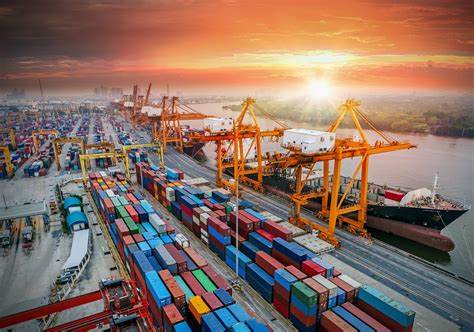With 852 km of coastline water and a maritime space of about 315.2440 sqm, which accounts for 34.1% of Nigeria's landmass, Atakpa (2021), the maritime industry remains significant to the growth and development of the Nigerian economy. It would not be wrong to say that Nigeria's economic growth largely depends on the maritime industry because, as an oil-producing nation, Nigeria depends mainly on the exportation of crude oil and other natural and human-made-in-Nigeria products to the outside world. Similarly, just like any other nation, Nigeria also depends on the maritime industry to import goods that are not locally made in Nigeria.
It is said that no nation is an island as no country is 100% self-reliant, and the maritime industry has gone a long way to serve as a bridge between nations and economies of the world, thereby fostering the growth of not just the Nigerian economy but also the global economy.
The maritime industry encompasses multiple components of shipping operations that ensure the handling and transhipment of items from the sea to the hinterlands or from one nation to another. The maritime industry's role in the global marketplace is vast, as it can influence exchange rates. A symbiotic relationship exists between the maritime industry and globalization, and Nigeria is not left out.
UNDERSTANDING THE MARITIME INDUSTRY
In the maritime industry, employees perform duties on board commercial, exploratory, service or other vessels moving on the high seas, inland waterways, lakes, coastal zones, harbors and noncontiguous areas, or offshore ports, platforms or other similar sites.
The Maritime Industry is waterborne commerce – about moving people and goods over the water.
Maritime is mostly everything connected to the sea or waterways worldwide, especially navigation, shipping, trade and commerce and marine engineering. The industry has a direct impact on most of our everyday lives. In most cases, the primary things we need are made available through the maritime industry. For example, the oil and gas that powers our cars, many of our vehicles, our electronics, the coffee we drink, the foods we eat, and the clothes we wear mostly come from overseas.
The maritime industry in Nigeria can drive significant economic growth in Nigeria as other industries greatly depend on it.
KEY SECTORS AND COMMODITIES INVOLVED IN MARITIME TRADE IN NIGERIA
The volume of maritime trade in Nigeria is nothing short of impressive. Vessels of various sizes and types dock at Nigerian ports, exchanging goods and propelling economic activities. Some of the critical sectors and commodities that play a significant role in Nigeria's maritime trade include:
Oil and Gas: Nigeria's maritime trade is intricately tied to its oil and gas industry. As Africa's largest oil producer, Nigeria exports petroleum products, including crude oil, refined petroleum, and liquefied natural gas (LNG), via maritime routes. These resources' exploration, production, and export are vital to Nigeria's economic prosperity.
Agricultural Products: Nigeria's fertile lands and favourable climate contribute to a robust agricultural sector, and maritime trade is a crucial channel for exporting agricultural products. Commodities including cocoa, palm oil, rubber, and cashew nuts are shipped from Nigerian ports to destinations worldwide, meeting the global demand for quality agricultural produce.
Solid Minerals: Nigeria has abundant solid mineral resources, including tin, limestone, coal, iron or ore. These minerals are extracted from various regions and transported via maritime routes for processing and exportation. The maritime trade in solid minerals contributes to revenue diversification and attracts investments in the mining sector.
Manufacturing and Consumer Goods: Nigeria's growing manufacturing sector fuels the export of manufactured goods through maritime trade. Automobiles, textiles, processed foods, and consumer goods find their way into cargo ships, catering to regional and international markets. Maritime trade acts as a conduit for Nigerian products to reach global consumers, stimulating economic growth.
Containerized Goods: Containers have revolutionized the maritime trade landscape, enabling efficient and secure transportation of a wide range of goods. Nigeria's ports handle a significant volume of containerized goods, including electronics, machinery, furniture, and apparel. These goods are imported and exported, reflecting Nigeria's active participation in global trade networks.
THE CONTRIBUTION OF THE MARITIME INDUSTRY TO THE GROWTH OF NIGERIAN ECONOMY
The maritime industry is a critical component in the economic development of many countries, particularly those with a solid export-based economy. It has, in no small measure, impacted the Nigerian economy in many ways, which include:
Job creation: The maritime industry is viable and creates multiple jobs for the citizens. In Nigeria, the available jobs in the maritime industry have a multiplier effect on the development of other economic activities like freight forwarding, dock working, towage, pilotage, warehousing, and cargo handling, all of which depend on the maritime transport industry.
National security: Like in other countries, the Nigerian Navy and Coast Guard use ships to protect the country's territorial waters and safeguard international trade routes. Moreover, security has a direct impact on the economic growth of any nation.
Availability of goods for consumption: The shipping industry significantly impacts many aspects of our daily lives. From what we eat to the clothes we wear and the electronic devices we use, much of what we consume has likely been shipped at some point during its journey from production to consumption and by extension, it adds value to human life.
Facilitates bilateral trades and foreign exchange: Thanks to the maritime industry, Nigeria can transport raw materials and finished products to other countries, thereby facilitating positive trade and business relationships with other countries and securing foreign exchange for Nigeria.
Creation of Entrepreneurs and Small and Medium scale Industries: The maritime industries have, to a great extent, encouraged the proliferation of importation in Nigeria, thereby leading to the creation of small businesses as well as medium scale industries and allowing them to thrive, and it has also led to less dependence on the government.
Fosters friendship and good relationships between Nigeria and other nations. Over the years, Nigeria has worked in partnership with neighboring countries to safeguard the coastal borders of the countries, and by doing so, a friendly and healthy relationship that fosters peace and economic growth has been formed.
Nigeria's maritime trade encompasses diverse commodities, reflecting the nation's multifaceted socio-economic landscape. From raw materials to semi-finished and finished commodities, the maritime industry facilitates the exchange of goods, economic growth, national security, and Nigeria's integration into the global marketplace.
Interested in benefiting from the wealth of resources in the maritime industry? Visit our website or connect with us on social media @saraprocure on Instagram, Twitter and Threads






Comments
Please log in to leave a comment.